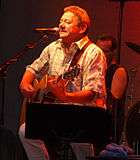Wolfgang Ambros
Wolfgang Ambros is an Austrian singer-songwriter, most famously known for setting the then-new trend in the 1970s known now as Austropop.[1] He is most famous for his songs "Da Hofa" and "Schifoan".
Wolfgang Ambros | |
|---|---|
 Wolfgang Ambros | |
| Background information | |
| Birth name | Wolfgang Ambros |
| Also known as | Die Numma Ans vom Wienerwoid |
| Origin | Vienna, Austria |
| Genres | Pop Folk rock Blues |
| Occupation(s) | Musician, composer, singer-songwriter |
| Instruments | Guitar |
| Years active | 1971- |
| Associated acts | Austria3 |
| Website | Wolfgang Ambros |
Music
His most famous songs are "Schifoan", "Es lebe der Zentralfriedhof" and "Zwickt's mi". "Schifoan" is effectively an anthem for the Austrian ski tourism and industry. Many Austrian skiers—but also many others—know the lyrics of this song.
His musical styles are pop-rock and sometimes blues-elements. His first LP Es lebe der Zentralfriedhof was very controversial, because many critics accused him of copying and plagiarizing Georg Danzer.
Ambros also released 3 cover albums (including songs by Bob Dylan, Tom Waits and Hans Moser. His latest album Steh grod (2006) is very successful.
Cooperations
Since 1978 Ambros has cooperated with the duo Tauchen/Prokopetz, who were very successful with DÖF in the 1980s. Also since 1978 Ambros has sung at live concerts with his band No. 1 vom Wienerwald.
In the 1980s Ambros sang together with André Heller. One of his biggest concerts took place at the Wiener Weststadion. Another one on the Kitzsteinhorn was the highest place a rock concert ever took place.
There were also cooperative efforts with the Viennese blues-musicians Harry Stampfer, Hans Thessink, Günter Dzikowski and DJ Kidpariz.
In 1997 he founded with Rainhard Fendrich and Georg Danzer the public charity "Initiative für Obdachlose" and the project Austria 3. On 10 December 1997 they were playing a unique concert, singing as group their own (solo) songs. The concert was done to collect money for homeless people and their public charity. Because of the success of this concert they continued this project and made many concerts in Austria and Germany and released three live-CDs from 1998 - 2000 (and some greatest hits-CDs).
In 2005 he released the Album Der alte Sünder – Ambros singt Moser, which was a cover album recorded with Christian Kolonovits.
In 2002 he won the AMADEUS Austrian Music Award.
Discography
Albums
- 1972: Alles andere zählt net mehr
- 1973: Eigenheiten
- 1976: Es lebe der Zentralfriedhof
- 1976: 19 Class A Numbers
- 1977: Hoffnungslos
- 1977: " von Z-A"
- 1978: Wie im Schlaf (Lieder von Bob Dylan - Gesungen Von W. Ambros)
- 1979: Nie und nimmer
- 1980: Weiß wie Schnee
- 1981: Selbstbewusst
- 1983: Der letzte Tanz
- 1984: Der Sinn des Lebens
- 1985: No. 13
- 1987: Gewitter
- 1989: Mann und Frau
- 1990: Stille Glut
- 1992: Äquator
- 1994: Wasserfall
- 1996: Verwahrlost aber frei
- 1999: Voom Voom Vanilla Camera
- 2000: Nach mir die Sintflut - Ambros singt Waits
- 2003: Namenlos
- 2005: Der Alte Sünder - Ambros singt Moser (songs by Hans Moser - sung by W. Ambros with the Ambassade Orchester Wien)
- 2006: Steh Grod
- 2007: Ambros singt Moser - Die 2te (songs by Hans Moser)
- 2008: Ambros singt Moser - Das Gesamtwerk (songs by Hans Moser)
- 2009: Wolfgang Ambros Ultimativ Symphonisch
Live albums
- 1979: Live ...auf ana langen finstern Strassn (2 LPs)
- 1983: Ambros + Fendrich Open Air
- 1986: Selected Live (2 CDs)
- 1987: Gala Concert
- 1991: Watzmann Live (2 CDs with 25 Tracks; Re-Release, 2005, 2 CDs with 40 Tracks)
- 1997: Verwahrlost Aber Live
- 2002: Hoffnungslos Selbstbewusst
- 2007: Ambros Pur! (Duo Konzert mit G. Dzikowski - Live aus der Kulisse/Wien (DVD)
Plays
- 1973: Fäustling
- 1974: Der Watzmann ruft
- 1978: Schaffnerlos (Die letzte Fahrt des Schaffners Fritz Knottek)
- 1981: Augustin (Eine Geschichte aus Wien)
Singles
|
|
References
- Kohl, Katrin Maria; Robertson, Ritchie (2006). A History of Austrian Literature 1918-2000. Camden House. p. 260. ISBN 9781571132765. Retrieved 7 September 2016.
External links
- Official website (in German)
- Austria 3 Official website (in German)